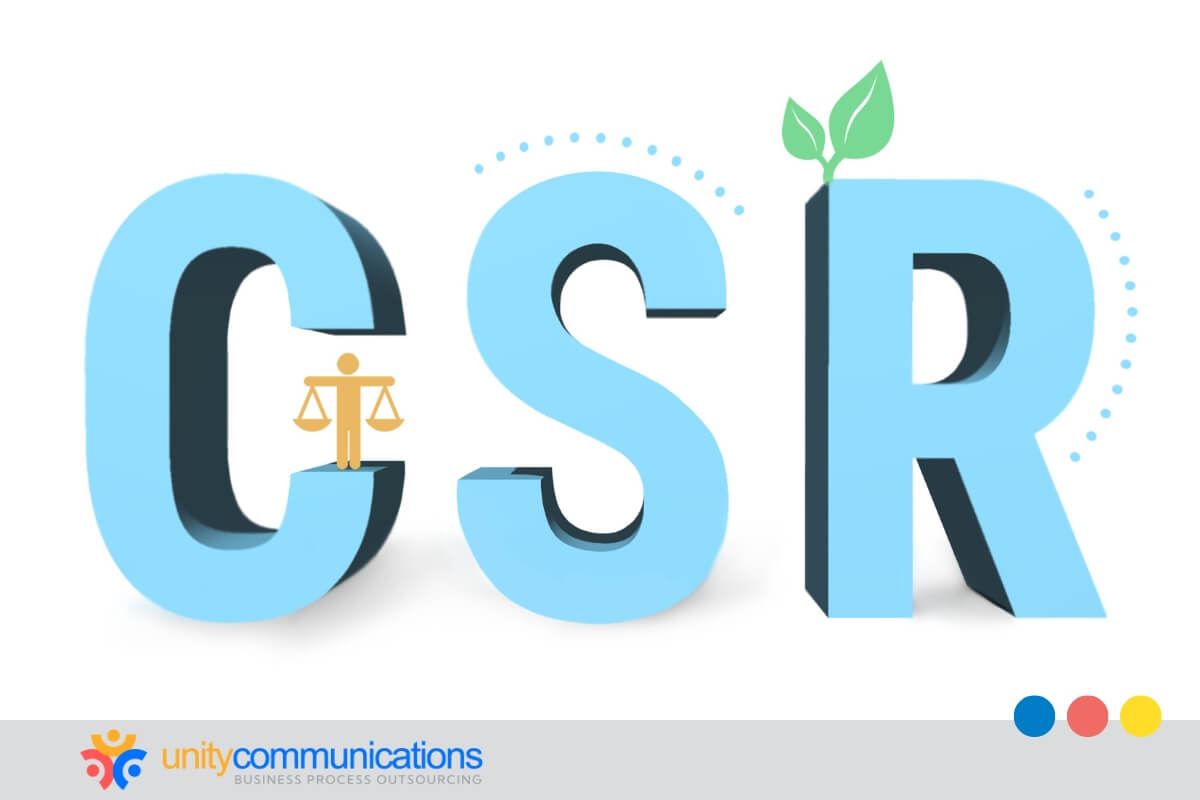IN THIS ARTICLE
Table of Contents
Governments face the intense pressure of doing more with limited resources. To meet growing demands, many turn to business process outsourcing (BPO) to streamline services and allocate resources efficiently to meet expectations.
However, the impact of private-public partnerships relies on more than cost savings. It hinges on who provides the service, how it’s delivered, and whether it aligns with public values. How do they advocate for responsible and ethical outsourcing?
This article explores the best practices for corporate social responsibility (CSR) in outsourcing public services. Read below to learn how governments can nurture effective, ethical partnerships that maintain accountability and public trust.
What is BPO in the public sector

Before we discuss CSR in public service outsourcing, let’s answer the question: What is BPO? Business process outsourcing (BPO) involves contracting specific tasks or services to external providers to help organizations focus on their core responsibilities. Common BPO functions include customer service, payroll processing, data management, and information technology (IT) support.
Although BPO companies frequently work with the private sector, government agencies sometimes outsource some roles for many reasons:
- Reduce operational costs through lower labor expenses
- Access specialized expertise and advanced technologies like cybersecurity or health analytics
- Improve service delivery by cutting through bureaucratic delays
- Scale resources quickly during peak periods like tax season or elections
BPO partnerships increase efficiency and productivity, but these advantages are inadequate when government funds and services are involved. Because the stakes are higher, outsourcing must uphold public trust, equity, and accountability.
CSR aligns private providers with public values, protects vulnerable groups, and operates transparently. The following sections explore in-depth how government agencies can embed ethical standards into every stage of outsourcing.
Ensuring fair labor practices in public service outsourcing
Public service outsourcing must champion ethical worker treatment. For example, a government outsourcing healthcare support services can require providers to offer health insurance and hazard pay to frontline workers exposed to high-risk settings.
Key practices that promote fair labor in outsourcing include:
- Living wages and benefits. Protect worker well-being with fair wages, adequate benefits, and paid leaves.
- Safe working conditions. Mandate compliance with workplace safety standards, such as ergonomic offices for call center employees or proper protective gear for sanitation workers.
- Reasonable work hours. Enforce limits on overtime and give employees enough rest to prevent burnout and exploitation.
- Worker representation and rights. Support unionization efforts or develop employee feedback programs to give workers a voice in decision-making and dispute resolution.
Ensuring fair labor practices in public service outsourcing safeguards worker rights, promotes dignity and well-being, and reinforces the integrity of government partnerships with private providers.
Promoting environmental sustainability in outsourcing
The public sector can promote environmental sustainability by working with BPO providers that prioritize eco-friendly practices. For example, a government agency outsourcing waste management services can choose a firm with active recycling programs and a fleet of energy-efficient vehicles.
Key strategies to drive environmental sustainability in outsourcing include:
- Green public procurement (GPP) policies. The OECD 2022 survey revealed that 92% of countries had a national GPP framework, with 29 incorporating it into their CSR programs. This data reinforces the need to partner with environmentally conscious vendors.
- Carbon footprint reduction. Outsourcing providers can decrease their carbon footprint by using renewable energy, optimizing logistics, and facilitating remote work. Providers must track fuel, electricity, and resource use with emission factors to set reduction targets and refine sustainable practices.
- Sustainable waste management. The Global Waste Management Outlook 2024 predicts municipal solid waste will rise from 2.1 billion tons in 2023 to 3.8 billion tons by 2050. Governments should work with BPO teams specializing in recycling, composting, and responsible hazardous waste disposal.
- Water and energy conservation. Responsible service providers use water-saving technologies and energy-efficient systems in their operations.
- Environmental compliance and reporting. Governments can perform audits and require reports to encourage transparency in meeting environmental regulations.
Promoting environmental sustainability empowers governments to reduce ecological impact, support green innovation, and ensure responsible stewardship of public resources through strategic vendor partnerships.
Strengthening community engagement through outsourcing
Strong public service partnerships go beyond delivering services. They are actively involved in and uplift the communities they serve. This means engaging local stakeholders, listening to their needs, and creating economic, social, and environmental opportunities.
Key practices for promoting community engagement in outsourcing include:
- Local job creation. Encourage BPO companies to hire and train locals to boost the regional economy.
- Public input and collaboration. By involving residents in decision-making through town halls, surveys, and advisory boards, determine whether BPO services meet community needs.
- Support for local businesses. Inform outsourcing providers to source supplies and services from small, local enterprises to stimulate economic growth.
- Educational and social programs. Require vendors to invest in community development, such as scholarships, skills training, or public health awareness campaigns.
Strengthening community engagement through outsourcing fosters inclusive development by empowering local voices, creating economic opportunities, and driving long-term social impact in the regions served.
Building trust through transparency and accountability in outsourcing

Building trust in public service outsourcing starts with clear communication and responsible practices. Transparency means openly sharing information about contracts, decision-making processes, and performance metrics. Accountability ensures that all parties deliver on their commitments.
Best practices that foster transparency and accountability include:
- Public disclosure of contracts. Make outsourcing agreements, costs, and performance expectations accessible to the public.
- Regular performance audits. Conduct independent evaluations to know whether vendors meet service quality and ethical standards.
- Clear grievance and feedback channels. Establish hotlines, online portals, or community meetings where citizens can report concerns and provide input.
- Accountability measures in contracts. Include non-compliance penalties and incentives for exceeding service expectations to foster vendor responsibility.
Building trust through transparency and accountability ensures that outsourcing partnerships remain ethical, effective, and aligned with the public’s best interests.
Ensuring compliance and mitigating risks in outsourcing
Effective public service partnerships require strict adherence to regulations and proactive risk management. With these approaches, governments can offer safe, reliable services that uphold public trust.
Key strategies to integrate compliance and risk management into CSR-driven outsourcing include:
- Regulatory adherence. Choose vendors that comply with labor laws, data protection regulations, and industry standards.
- Third-party compliance monitoring. Conduct regular audits and assessments to verify that your outsourcing providers meet ethical and legal requirements.
- Risk assessment and mitigation plans. Identify potential service disruptions, cybersecurity threats, or financial risks and implement mitigation strategies.
- Crisis response and contingency planning. Establish clear protocols for handling emergencies, such as data breaches, service failures, or labor disputes.
Integrating strong compliance and risk management practices into public service outsourcing ensures continuity, legal integrity, and public confidence in service delivery.
How innovation enhances CSR in public service outsourcing
New technologies infuse innovation, creativity, and forward-thinking into public-private partnerships. They optimize service delivery and help address complex social challenges quickly without straining resources.
Innovative tools that advance CSR in public service outsourcing include:
- Artificial intelligence (AI)-driven automation enhances efficiency in social services by quickly processing big data to identify eligible beneficiaries. Properly designed and audited algorithms reduce human bias in critical decisions such as resource prioritization.
- Blockchain secures public records and transactions to prevent fraud and promotes accountability in outsourced services through smart contracts.
- Green technology adoption involves using energy-efficient data centers, paperless systems, and smart infrastructure to reduce environmental impact.
- Digital inclusion initiatives include accessible online and mobile platforms that allow underserved communities to use public services efficiently.
Harnessing innovation in public service outsourcing strengthens CSR by boosting efficiency, reducing bias, increasing transparency, and expanding equitable access to essential services.
How CSR in outsourcing strengthens local economies
Corporate social responsibility (CSR) initiatives in public service outsourcing can drive significant positive change in local economies. When governments and providers prioritize hiring local talent, supporting small businesses, and investing in community programs, they create jobs, strengthen local industries, and promote inclusive growth.
For example, a government might require its BPO partner to establish offices in underserved areas to boost employment and skills development. These partnerships deliver essential services and elevate the local communities’ living standards.
Promoting good governance and ethical sourcing in public services

Strong governance and ethical sourcing are essential for maintaining integrity in public service outsourcing. Governance refers to systems and policies that promote transparency and align decisions with the public good. Ethical sourcing focuses on choosing suppliers and outsourcing companies that adhere to CSR practices.
Suppose a government agency outsources IT support. It can require vendors to buy hardware from fair-trade suppliers or partners that exercise fair labor practices in their manufacturing facilities.
Incorporating these principles into CSR in outsourcing public services builds trust and promotes accountability and responsible use of public resources.
Meeting stakeholder expectations with measurable CSR metrics
Building trust in public service outsourcing starts with meeting key stakeholder expectations, such as transparency, workers’ rights protection, and commitment to environmental sustainability and social responsibility.
Government agencies can assess whether their outsourcing partnerships align with these expectations by tracking specific CSR performance indicators:
- Local hiring and workforce diversity. The percentage of local hires and workforce diversity reflects the number of employees from the local community and the inclusiveness of the hiring practices.
- Labor law and wage compliance. Compliance with labor laws and fair wage standards assesses whether vendors follow legal labor requirements and provide fair compensation.
- Carbon footprint and energy reduction. Reducing carbon footprint and energy use involves minimizing environmental impact through sustainable practices.
- Community development outcomes. Community investment and development program outcomes track the effectiveness of social programs.
- Supplier audits and ethical compliance. Review how consistently vendors meet responsible business practices, including ethical sourcing standards and regulatory requirements.
In CSR-focused outsourcing, meeting stakeholders’ needs is as essential as delivering efficient services. Evaluating partnership performance strengthens long-term value and fosters trust-based public-private relationships.
The bottom line
Ethical and effective public service partnerships thrive on transparency, accountability, regulatory compliance, and environmental responsibility. By placing corporate social responsibility at the center of outsourcing strategies, governments can deliver high-quality services while building lasting public trust.
Ready to create outsourcing partnerships that truly make a difference? Start by putting ethics, accountability, and impact at the heart of your outsourcing strategy. Let’s connect today to explore how responsible outsourcing can deliver real results.





